CROSS CURRENTS
Sisters of Notre Dame de Namur • Ohio Province

From the Learning Lab in Cincinnati to the Village of Pelende, DRC
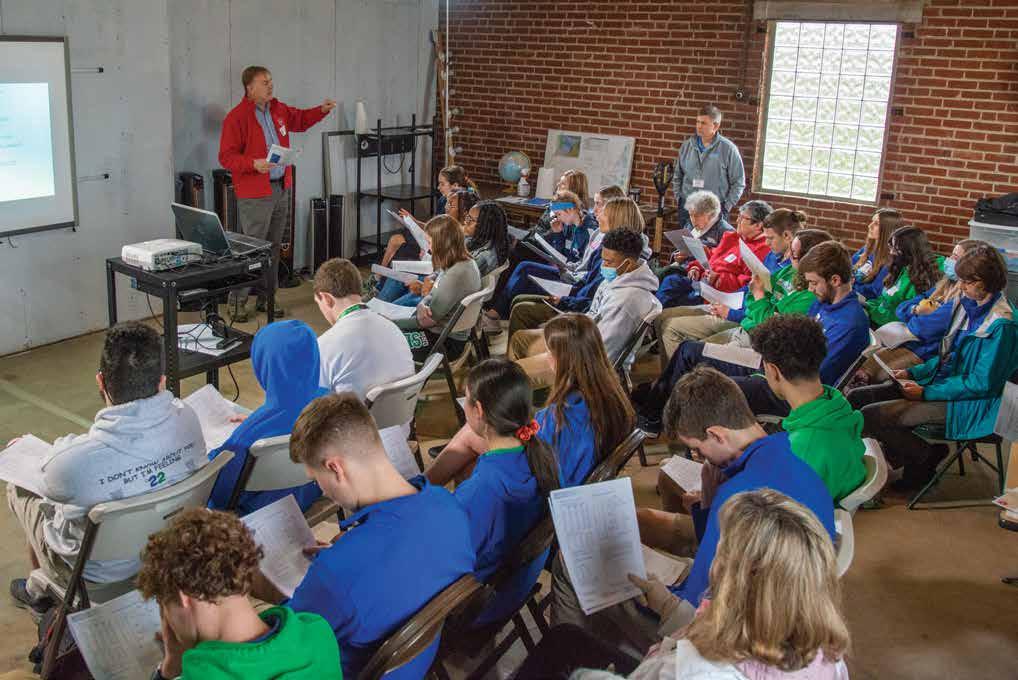
CLEAN WATER FOR LIFE
SUMMER 2022 VOLUME 18 ISSUE 2
CROSS CURRENTS
Sisters of Notre Dame de Namur change lives by making known God’s goodness with you.
Throughout the world, we are committed to education. We take our stand with those living in poverty, especially women and children in the most abandoned places. Cross Currents is published two times a year for friends of the Sisters of Notre Dame de Namur by the Ohio Province Development Office. We invite reader responses on the content of this publication or on the work of the Sisters of Notre Dame de Namur. Comments may be submitted to Kevin Manley, Director of Development, at kmanley@ohsnd.org.

Sisters of Notre Dame de Namur Ohio Province
701 E. Columbia Avenue Cincinnati, OH 45215
513-761-7636 / 513-761-6159 (fax) www.sndohio.org
Leadership Team:
Sister Kathleen Harmon, SNDdeN, Provincial
Sister Donna Marie Jurick, SNDdeN
Sister Patricia Loome, SNDdeN
Publisher: Kevin Manley kmanley@ohsnd.org
513-679-8117
Writer: Joe Foley

Editor: Angela Weisgerber
Photography:
Cover, page 5 (bottom center), page 6 (top left), page 7, back cover (top left): Mary Dee Donovan.Page 8: Lucia Lezama España. Page 9: Courtesy of Jan Turala. All others by local and international Sisters and staff.
COVER:
This spring, Science, Technology, Engineering and Math (STEM) students and faculty from Mount Notre Dame High School (Cincinnati) and Chaminade
Julienne High School (Dayton) spent several hours meeting with Sisters, exploring updates to the Photovoltaic Learning Lab and learning how their involvement in the Sisters’ Clean Water for Life project is impacting fellow Notre Dame students around the world.
SISTERS OF NOTRE DAME DE NAMUR
CLEAN WATER
FOR LIFE.
 KEVIN MANLEY Director of Development
KEVIN MANLEY Director of Development
The Sisters of Notre Dame de Namur have for years pushed infrastructure development. They have done this individually and as a congregational priority. Such development has had many fronts, among them fundraising, education, engineering, and boots on the ground. And while one or more fronts may have at intervals suffered setbacks, such as in the depths of COVID, other fronts have pushed forward, relentlessly so. And now, in Pelende, the battle is nearly won.
CROSS CURRENTS
SUMMER 2022 | Vol. 18/Issue 2
3
The village of Pelende, in the Democratic Republic of Congo, is about to get water. This is a big deal. It means better health, it means more children in school, it means hope can once more fill the hearts of its five thousand residents.
ON PAGE 4
Students at the Sisters of Notre Dame de Namur school in Pelende will now have electricity, clean water and internet access at their school.
CONTINUED
Pelende is in some ways similar to other of the Sisters’ 16 development projects in the Democratic Republic of Congo (DRC) and Nigeria — and in some ways different. The similarities mostly relate to need. Without readily available clean water, disease is far more prevalent, education is hindered in that children are out of the classroom (in pursuit of water), adolescent girls drop out of school because of a lack of sanitation, women and men who otherwise might contribute to economic development instead are consumed with the daily trek to the waterhole or stream; the list goes on. And Pelende has experienced all of this.
Yet, Pelende is different as well. Its older residents remember when clean water flowed through a system constructed by the Jesuits in the 1950s and 60s. They remember the promise of such water, and how it changed daily life.
From the Beginning
Water, or the lack of it, has a long history in Pelende, a history that involves the resolve of its residents, Jesuits, French consultants, an American engineer, Midwestern benefactors, Cincinnati high school students and school children, many still in grammar school. Especially crucial have been Sisters of Notre Dame de Namur. Sisters have worked in Pelende and other DRC villages as teachers and healthcare providers. They’ve worked at the provincial level coordinating electricity, water and satellite communications
projects, including in Pelende. And they’ve worked in congregational leadership from the United States to Rome providing financial support. Importantly, Sisters have worked from Mount Notre Dame in Cincinnati raising funds, testing technology and spreading the word about clean water.

Technology in particular received greater emphasis beginning with a 2002 congregation-wide meeting of the Sisters, at which it was decided all Sisters, no matter their location, would be provided equal access to technology with the understanding that such access would by extension benefit the communities in which they ministered. This access would be provided whether Sisters lived in economically affluent nations, such as the United States, or in post-colonial and still developing nations, such as the DRC. The decision meant a reallocation of resources, both capital and human, much as a reallocation of resources from Europe to America enabled American provinces to build schools from California to Massachusetts. It also meant a reallocation of the congregational leadership’s attention, with increased focus on those provinces near the equator. The 2002 decision had a dramatic impact on the Sisters’ work in the DRC, no more so than in Pelende.
Pelende is two days rough ride from the national capital of Kinshasa. In many ways, it’s emblematic of the larger country. In the DRC, life spans are short — just over 60 years. Nearly 90 percent of its workforce is without
regular employment. Most people get by on a couple dollars a day. The country has endured decades of political strife and war, some local, some continent-wide.
Through it all, and since 1894, the Sisters have remained in-country. They run primary and secondary schools in Pelende that together serve 1,000 students and boarders, and also operate a hospital. In the early 2000s, and growing out of the 2002 congregational meeting, they began installation of a photovoltaic system providing the village with electricity.
Yet clean water, but for a brief period, has proven elusive. The Jesuits made the first attempt in 1956, the infrastructure for which, in the form of large holding tanks, still exists. But within a 20-year-period, for lack of maintenance and in tandem with other infrastructure decay throughout the country, the system began to run dry.
Sister of Notre Dame de Namur Margaret Goode, a teacher during that time, saw those unused tanks day in and day out. She saw the children snaking down the hill to the spring, and an hour later snaking up again. She saw the water buckets on their heads, the hours of lost time, the forfeiture of human potential.
And for 40 years she let people know about it. Even as civil war spilled over from Rwanda, she pushed for a renewal of the water infrastructure. No meaningful progress could be made, she believed, unless there was water.
“Sister Margaret nearly lost her mind trying to get a resolution,” says United Kingdom-based Louis Casey, Sisters of Notre Dame de Namur engineer for the Africa Clean Water Project. “There was an overall acceptance on the part of society that things were disintegrating.”

Mr. Casey’s arrival in 2007 and Sister Margaret’s departure a few years later provided the needed overlap to begin improvements. In 2010 the photovoltaic system
THE LEFT
was completed on the convent roof to establish an independent electrical system, one that could turn on the lights, provide refrigeration, and importantly — one that could move and purify water.
ously, other groundwork began to take shape. Casey was on-site in Pelende and in other African villages. Fundraising began, both by the Sisters and the Jesuits. And in Cincinnati, the Sisters constructed a Learning Lab at their Mount Notre Dame Convent for students and engineers to preflight technology for power generation and water purification, power and purification that would have to work and survive in equatorial conditions, and that could be maintained and repaired by local technicians.
ABOVE
On April 5, 2022, students from Mount Notre Dame High School (Cincinnati) and Chaminade Julienne High School (Dayton) attended a presentation given by Louis Casey at the Sisters’ Photovoltaic Learning Lab in Cincinnati.

Three years later a French water company provided a scope of work and cost estimate for a new water system. Simultane-
The Sisters also reached out to friends and former students whose expertise and professional connections could advance the effort. Jane and Glenn Bullock, friends of the Sisters who own a water filtration system used by a major American restaurant chain, volunteered their system for Africa. Another individual offered to purchase the heavy hydraulic pumps necessary to lift 19,000 gallons of water over 600 feet — each day — and to transport that same volume a mile distant.
5 4 CROSS CURRENTS SISTERS OF NOTRE DAME
DE NAMUR
ON
Louis Casey, project engineer for the Sisters’ Africa Clean Water Project, poses with Pelende villagers who will benefit from the renovated water system this fall.
CONTINUED ON PAGE 6
The maternity hospital in Pelende will now have clean, potable water alongside electricity.
Then Came COVID
Nevertheless, restoration of the system did not prove easy. Progress hit high hurdles. Sourcing of equipment. The cost of that equipment. Lack of vehicles to move that equipment. Nearly non-existent roads on which those vehicles and equipment had to transit.
Then came COVID. Though still moving forward in America, in the DRC the Pelende project came to a halt. A year later, the Jesuits, unable to successfully secure their share of the project’s funding, reluctantly pulled out.
“That’s when we had to make the decision,” says Casey. “Do the Sisters do this by themselves? And it was decided, yes they will.”
The system, says Casey, will differ from other African water systems built by the Sisters in that water will first flow to the village with a connection then coming off the primary piping to service the Sisters’ needs.

“We’re actually doing two systems, the village system, and connected
pumps will then use the kinetic energy of the stream to lift the water, without the use of electricity. (Electricity will later be used to purify the water and move it to various locations.)
“The beauty of these things [pumps] is that they produce a very high pressure, 300 pounds per square inch. You can’t just go out and buy these things.”
to it, the Sisters.”
Water will also flow to the Jesuit school.
Such an arrangement serving different constituencies, each having large numbers of people, will necessitate a kind of water company to handle varying degrees of filtration and purification, to assess usage fees, to handle maintenance, etc. This ongoing business end of the project will itself present a challenge because of cultural differences involving the distribution of resources, with some believing that water belongs to everyone and therefore should be free.
“These issues are intricate,” says Casey, “and part and parcel in engaging in development in these communities.”
The Pelende project also differs from many of the Sisters’ other water projects in that water will come from an existing spring instead of via a borehole, water that according to Casey is already high quality. Swiss-manufactured
The Pelende project will move its first water in November 2022. ‘Long-lead’ items, those components of the project taking the most time to secure, are in place or in transit. Active procurement for other items is proceeding at pace, with many such items bought from a local network of vendors and contractors. This local sourcing of materials and services has been a priority for the Sisters in that they seek not only to reduce supply-chain times, but to promote local and regional economic development.
Piping for the system will include water that is filtered and potable alongside untreated water to be used for things other than drinking, cooking and bathing. A project-designated vehicle has also been purchased to ease transportation. Perhaps most importantly, day-to-day oversight of the project has been shifted from the international congregation to the local Sisters of Notre Dame de Namur province in the DRC, with Congolese Sister Dorothée Moya — long familiar with the sites and with hands-on knowledge of the equipment — in charge not only of Pelende but other DRC sites where photovoltaic electricity and clean water have been or are currently being introduced.
Solidarity
In addition to engineering and testing through the Learning Lab in the United States, and onsite in Africa, and in addition to fundraising, the Sisters have sought to build solidarity with, and understanding of, those marginalized by a lack of clean water. Through visits and presentations, the Sisters have built partnerships with over 80 schools, parishes and parish groups, that these organizations can push to the forefront the imperative of clean water, and advance as well a general and increased consciousness of those living on a daily basis without it.
Key to this success has been the educational work of Sister Ann Fanella and other Sisters of Notre Dame de Namur who travel to classrooms in Cincinnati and

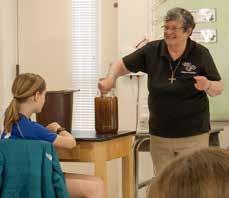

ON THE LEFT
As part of their visit to the
in
throughout the country. These Sisters, while speaking directly to students, are by extension spreading the word to teachers and administrators as well as to parents. And while countries such as the DRC and Nigeria are mentioned, it’s the children-tochildren connection that hits home. Sister Ann will, for example, hold up a glass of water and say, “This is what we drink.”
Then she’ll add a tablespoon of dirt. “The children in Africa, this is what they drink.”
Then she says how far it is just to get that water, and how long it takes — on foot and with a bucket on your head. And how long it takes to search out firewood to later boil that water.
The children — and the teachers and administrators and parents —
understand. And they act. Not only do they have a new understanding of the difficulties faced by others, they also work to do their part in relieving those difficulties — through school fundraising. It’s pennies, nickels and dimes from the younger students, more from the older students, and even more from parents. Sometimes it adds upto $100, sometimes $1,000. But whatever the amount, it directly benefits people in need an ocean away. It’s concrete support, and it’s solidarity.
Through Sister Ann, children and teachers and parents have become part of the Sisters of Notre Dame de Namur mission — to give people what they need for life. And in Pelende, that means water!
To watch a video about the Sisters’ Clean Water for Life Project, scan the QR code or visit our YouTube channel at https://youtu.be/rnJuXYB19Fs
ON THE LEFT

7 6 CROSS CURRENTS
Mount Notre Dame High School students explain the components of the photovoltaic system to Chaminade Julienne High School students at the Photovoltaic Learning Lab on April 5, 2022.
ABOVE
Sister Dorothy Moya (right) and electrical contractor Jimmy Abeya (second from right) and his staff discuss the plans for renovating the Pelende water system.
Photovoltaic Learning Lab
Cincinnati, Chaminade Julienne High School students share lunch and conversation with Sister Jo Ann Depweg who served in Brazil for 30 years.
Sister Ann Fanella demonstrates the cleaning powers of the P&G water purification packets to students at Summit Country Day School in Cincinnati.
NEWSBRIEFS
GRATITUDE FOR THOSE WHO SERVED IN THE NICARAGUA MISSION
The decision to close the 41year Notre Dame Nicaragua Mission was difficult and heartbreaking, and done in the face of escalating social, political and economic crises. The Sisters serving within the country consulted closely with Nicaraguans, who would continue the work before closing the mission formally.
The Sisters of Notre Dame de Namur are grateful for the many Sisters from different provinces who have served in Nicaragua since 1981. Many international volunteers made a substantial contribution to their ministries, including in education, school construction, environmental projects, job development, nutrition, health care, and pastoral ministry to women and children.
ANNIVERSARIES
ON THE LEFT
The Sisters also want to acknowledge the donors who made so much possible in the second poorest country in Latin America, which year after year suffers from natural disasters and political violence.
“We’re grateful to the people of Nicaragua for letting us be
a part of their lives,” says Sister Rebecca Trujillo. Sister Rebecca provided integrated services for people with disabilities through Special Families of St. Julie Billiart. The Sisters ask for continued prayer for the Nicaraguans, people of great faith in the Good God.
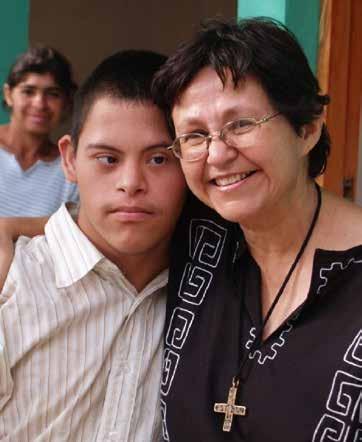
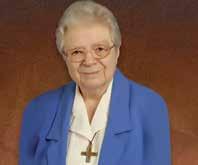

Pax Christi USA, working to transform society through nonviolence and peacemaking, and closely associated with the Sisters of Notre Dame de Namur, is in 2022 celebrating its fiftieth anniversary. The late Sister Mary Evelyn Jegen, SNDdeN, was an early leader and served as the USA chapter’s first national coordinator. She also served as vice president of Pax Christi International and headed up the organization’s delegation to the United Nations. In 2011, Sister Patricia (Patty) Chappell, SNDdeN, was named executive director of Pax Christi USA, and served until 2019.

One hundred twenty five years ago this year, Sisters of Notre Dame de Namur Julia McGroarty and Mary Euphrasia Taylor secured articles of incorporation for Trinity College in Washington, D.C., now known as Trinity Washington University. It would be three years more before students began studies, but between August 20, 1897 and November 22, 1900, land was found and bought, funds were raised, buildings erected and students recruited. Trinity’s first class graduated four years later, and was known as the Red Class of 1904, red for the graduates’ fierce spirit. Trinity became one of only a handful of women’s colleges in existence at the beginning of the twentieth century, including Vassar, Wellesley, Smith and Bryn Mawr.

APOPKA, FLORIDA
Sisters of Notre Dame de Namur are celebrating fifty years of service to migrant and other low-income workers in the community of Apopka, Florida. The early ministry team of Sisters Ann Kendrick, Cathy Gorman, Gail Grimes and Anne Parry established a health clinic; services for tutoring, counseling and immigration assistance; a farmworkers association; a credit union; and a community center. These ministries continue to this day.
plant business.
9 8 CROSS CURRENTS SISTERS OF NOTRE DAME DE NAMUR
PAX CHRISTI USA TRINITY WASHINGTON UNIVERSITY
FARMWORKER MINISTRY
Early 1900s photo of Trinity College in Washington, DC
Sister Mary Evelyn Jegen
Sister Rebecca Trujillo embraces a member of the Special Families of St. Julie Billiart community.
WE WILL ALWAYS REMEMBER
We are mindful that we stand on the shoulders of those who have come before us. For complete obituaries, please visit sndohio.org
SISTER ELAINE BALLMANN SND deN

Formerly Mary Gabriel • November 1, 1931 – June 20, 2022
Sister Elaine spent 31 years in formal education, beginning in 1965 when she was missioned to Holy Angels Parish School in Dayton, Ohio. In 1968, Sister Elaine was named Principal of the school and served in that role for the next 15 years, working with her teachers to build a Christcentered, caring faith community committed to education. In the mid-1980s, Sister Elaine helped direct two 30-day retreats at St. Therese’s Retreat Center in Columbus for seminarians attending the Pontifical College Josephinum. In 1987, she was asked to join the staff there. During her 32 years at St. Therese, Sister Elaine helped with administrative and physical tasks as well as directed retreats. Her sense of humor, joy of life, appreciation of little things, contemplative spirit, and sincere interest in each of her Sisters added greatly to community life.

SISTER JUDITH WESSELS SND deN



Formerly
Beginning in 1959, Sister Judith spent 18 years teaching religion, reading and art, but especially loved to teach the “little ones” in first grade. During her years in the classroom, Sister Judith wrote The Story of St. Julie for Children to help children learn about the saint who had tremendous influence on her own life. In the late 1970s, the Sisters were in need of nurses to care for aging members so Sister Judith earned her RN and served five years at Mt. Notre Dame Health Center. Sister Judith then spent three years writing and doing research in the Ohio Archives. In between ministries, Sister Judith also served six years as Coordinator and Director of Religious Education. In 1990, Sister Judith joined Faber House Jesuit Residence part time and served there for 13 years in a full-time capacity until 2009 when she took responsibility for the Province Library. She served as the Province Librarian until June 2022.
“I did not have a brother, but if I did, I would want him to be just like Lou Turala,” said one of our Sisters. Understandable! Lou Turala was the ultimate big brother. He loved the family home in a Chicago neighborhood where his parents had a small grocery store. One of four living children, Lou developed a desire to help others when his father died at an early age, leaving his mother to provide for the two children still at home. Lou took pride in being an altar boy and later serving in the Korean War. Upon his return, following in his father’s footsteps, Lou became a butcher and worked for Jewel Food Stores as the chain began to grow throughout Chicago. He was a loyal employee who always wanted to take good care of his customers. He found pleasure in a simple lifestyle, biking on his day off and driving to enjoy the beauty of Lake Michigan after Mass and brunch on Sunday.
When Lou retired, he moved to Hot Springs, Arkansas, where his sister and her husband owned a small motel. He thought he could help his big sister with the work, and he did, finding time to bake and share his famous peanut butter cookies and to call his younger sister in Dayton every day.
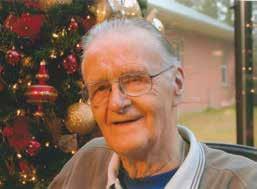
During that time in Arkansas, Lou got to know the Sisters of Notre Dame de Namur from Notre Dame High School - Chicago where his sister went to high school. He and his mother then became familiar with the foundress, Julie Billiart. Realizing their worldwide educational mission changed lives, Lou wanted to take part in it, which he did through his regular, generous contributions. He loved hearing from the Sisters and as always, the questions on his lips were, “What do you need? How can I help?” It was at this period of his life that Lou began working on an estate plan that would enable him to provide for his family and for the Sisters. Lou passed away recently, and the Sisters were honored by his thoughtful gift and we were grateful to be able to thank him during his lifetime. His gift will make a difference in the lives of so many, including the Sisters.
As I have talked with you through the years, many of you have expressed a desire to participate in the mission of the Sisters, helping to support their work and their care of their retired Sisters. There are several ways that allow you to make that special gift and still provide for your family as Lou did. I am happy to talk with you about these options as well as the tax consequences if you would like. I can be reached at 513-679-8106 or at khadden@ohsnd.org.
KAREN HADDEN Associate Development Director 513-679-8106 khadden@ohsnd.org

10 SISTERS OF NOTRE DAME DE NAMUR
Judith Anne • June 27, 1939 – July 13, 2022
CROSS CURRENTS
CROSS CURRENTS
LOU TURALA WAS ALWAYS READY, "WHAT DO YOU NEED? HOW CAN I HELP?"
CINCINNATI PARTNERS IN ACTION LUNCHEON
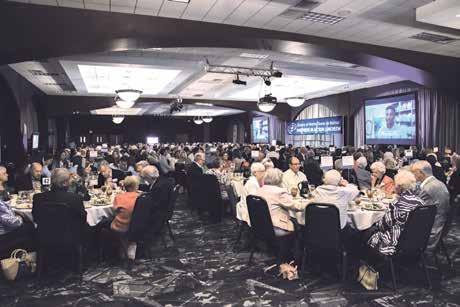



On May 11, more than 500 new and old friends joined us at the Cintas Center for our 18th annual Partners in Action luncheon in Cincinnati. During the one-hour program, our guests learned how Sisters of Notre Dame de Namur change hearts and lives in our backyards and around the world. The luncheon was made possible by the support of more than 50 generous sponsors including our Founding Partner, Fort Washington Investment Advisors.
Stories included the Sisters’ work to provide electricity and clean drinking water in the Democratic Republic of Congo, to provide STEM educational opportunities through their Photovoltaic Learning Lab, to support low-income students with scholarships, and to provide legal assistance to people who are impoverished. The Partners in Action Luncheon raised nearly $400,000 for educational programs and ministries, and care of retired Sisters.
facebook.com/SistersOfNotreDamedeNamurOhio youtube.com/c/SistersofNotreDamedeNamurOhioProvince twitter.com/SNDdeNOhio instagram.com/sndohio linkedin.com/company/sisters-of-notre-dame-de-namur FOLLOW US ON SOCIAL MEDIA + THE WEB Address Service Requested
VISIT OUR WEBSITE WWW.SNDOHIO.ORG FOR MORE DETAILS AND TO REGISTER ABOVE Live the Good volunteers including Sister of Notre Dame de Namur Carol Wetli (front row, 2nd from left) at IMAGO in Cincinnati.
Saturday, September 10, 2022 Live the Good Volunteer Opportunity 1N5 Mt. Notre Dame Convent Cincinnati, OH 9:00 a.m. to 11:00 a.m. Registration Required Wednesday, November 2, 2022 All Souls’ Day Mass and Luncheon Mt. Notre Dame Convent Cincinnati, OH 11:00 a.m. to 1:00 p.m. Registration Required
CALENDAR OF EVENTS





 KEVIN MANLEY Director of Development
KEVIN MANLEY Director of Development




















